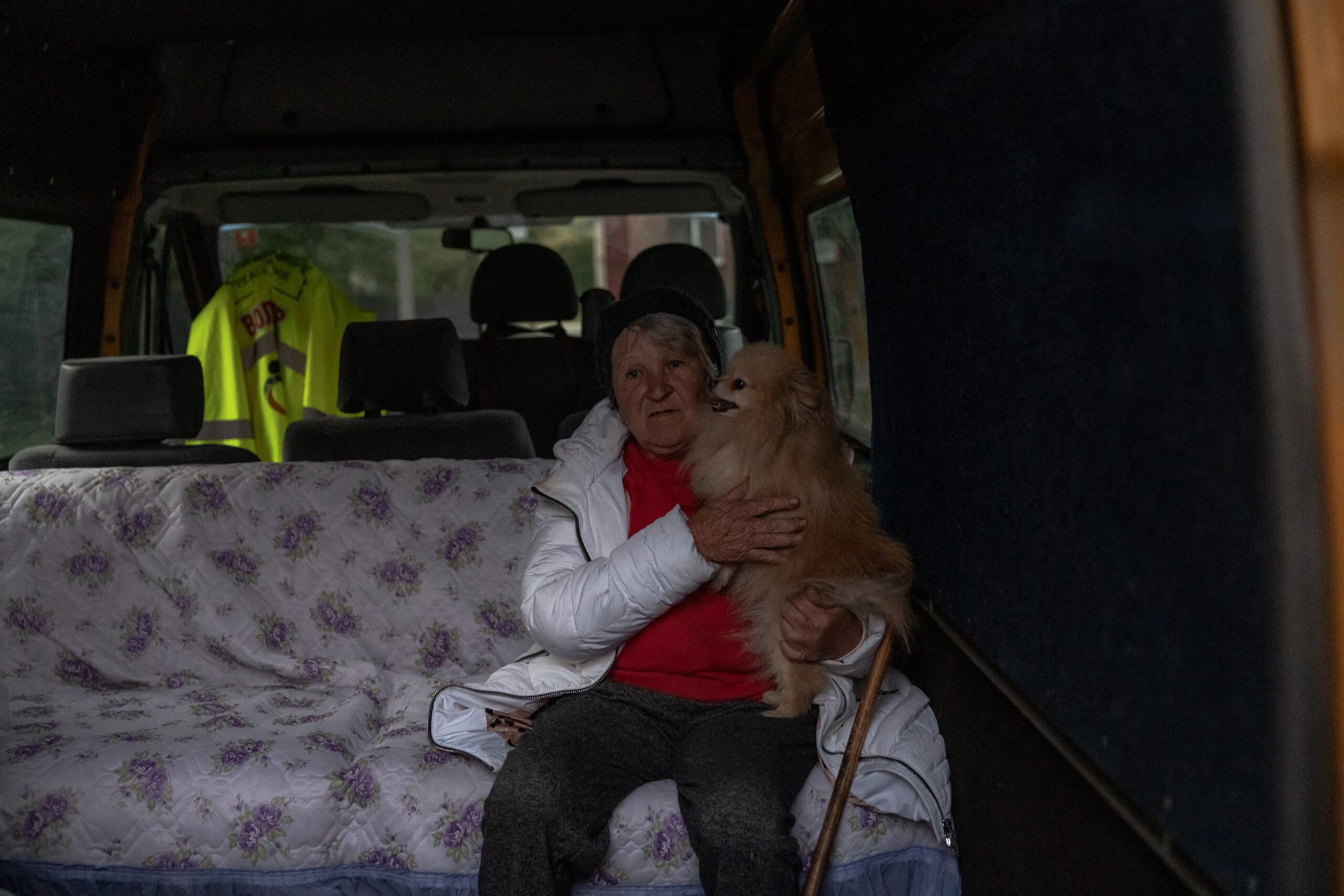
Olga Garmash, 68-years-old, an evacuee from the village of Lyptsi, waits with her dog in a minivan at an evacuation point in Kharkiv, on May 11, 2024, amid the Russian invasion of Ukraine. Ukraine’s defense ministry said on May 10, 2024, that Russia had launched a surprise attack on the Kharkiv region, making small advances into a border zone from where it had been pushed back nearly two years ago. “Fighting for villages… continues in the border area,” Ukrainian military spokesman Nazar Voloshyn said on national television on Saturday. There was “heavy fighting” in the border area and 1,775 people have been evacuated, Kharkiv regional governor Oleg Synegubov wrote on social media. Agence France-Presse
RUSSKIYE TISHKI, Ukraine — Olena Gubenko refused to leave her home throughout the war but she evacuated as Moscow’s troops closed in during a new offensive in Ukraine’s northeastern Kharkiv region.
With her came a non-negotiable pack of over a hundred dogs that she rescued over the years.
“I’ll be with them, wherever they are… they’re my life,” she said, pushing her frightened canines into cages that volunteers loaded in vans.
Many residents like Gubenko endured over two years of war at home, staying put as Russian forces stormed and occupied the region between spring and fall 2022.
READ: Abandoned animals join Ukraine’s war exodus
They lived in relative calm under Ukrainian control, despite intensifying strikes.
But Russian troops surged through defense lines on Friday, opening a new front with artillery and aircraft, forcing thousands to flee.
Moscow’s forces were now pushing just a dozen kilometers north of Gubenko’s home in Ruski Tyshky, around which explosions echoed.
“Russia is advancing… It’s very dangerous here,” she said, pointing toward the north of the settlement.
In the garden, dozens of wooden dog houses stood next to a playground with destroyed swings.
READ: Russia ramps up Ukraine offensive ahead of arms boost
“There is shelling every day, (the dogs) live in the basement… it’s dark in there,” she said.
With a flashlight on her head, Gubenko went back and forth to get her dogs out of the pitch-black cellar filled with spiderwebs.
Volunteers waited outside her red door stamped with PEOPLE, CHILDREN in capital letters.
They checked if the dogs got along with each other -– with Gubenko’s expertise –- before locking them in metal cages.
‘Thought we could stay’
“I don’t like people. I’m not evacuating people; I would leave them there,” said volunteer Pavel Khramtsov, adding that the authorities had long warned people to evacuate.
“It was their choice to stay, dogs don’t have a choice.”
Some Ukrainian volunteers had run into Russian soldiers a day before, Khramtsov said, with one of them getting shot in the legs.
“Now they’re attacking, you’re always watching out not to run into Russian troops,” he said.
Volunteers and police managed to evacuate nearly 6,000 people in the region, according to Kharkiv governor Oleg Synegubov.
They fled advancing Russian forces, who announced gains near the town of Vovchansk and the border village of Lyptsi.
At a first gathering point for evacuees from Lyptsi, 74-year-old Kateryna Stepanova said she hoped she could return to the village where she had spent her entire life.
“It was a hopeless situation, but we thought we could stay… we wanted to stay at home, planted a garden, had chickens and ducks,” she said.
But Stepanova ran away “in whatever I was wearing, dirty things” when bombs fell on her street.
With more time to prepare her departure, Gubenko was lucky to be able to take her pets to a shelter where she was promised she could stay with them.
She also hoped to return one day.
“We built new enclosures for them. I hope the war ends and we come back… they’ll be with me, and everything will be fine.”

